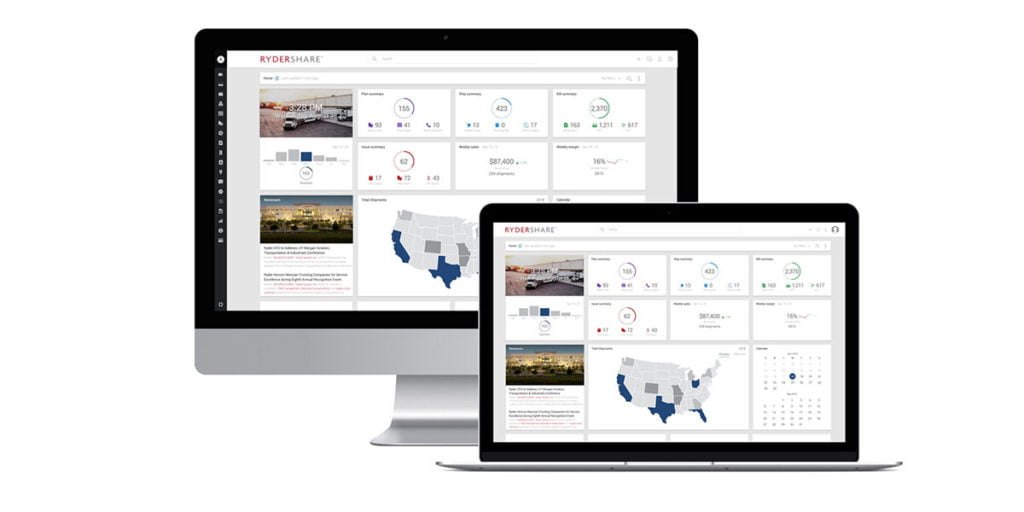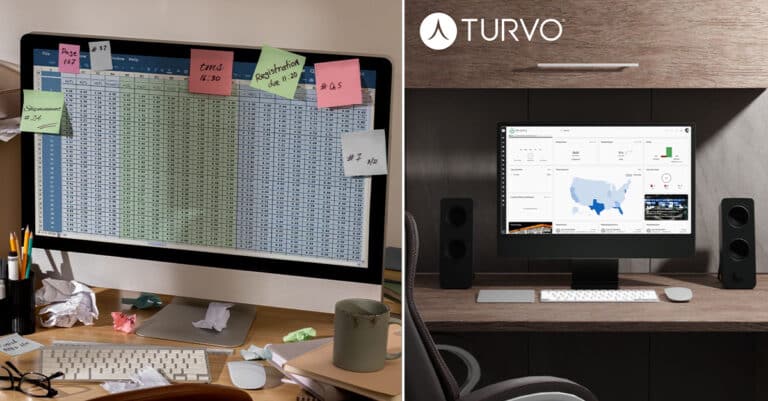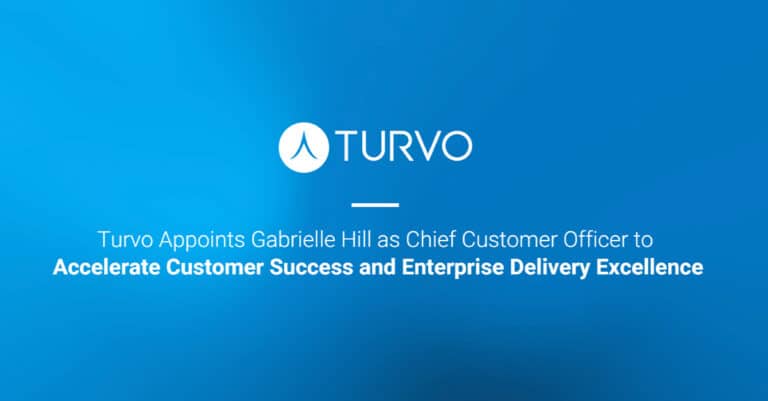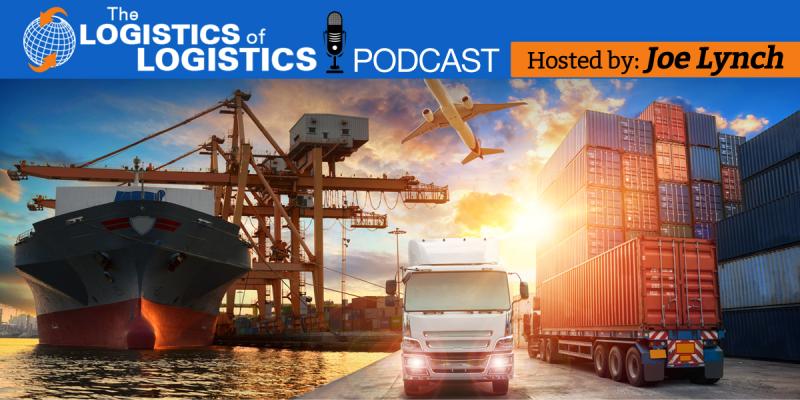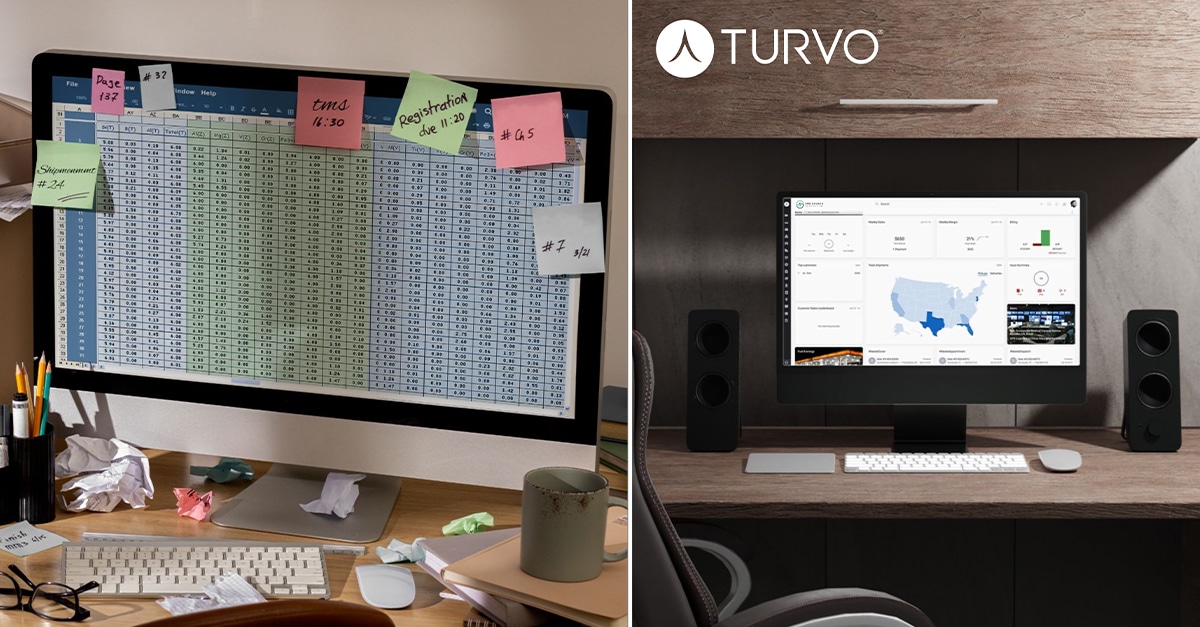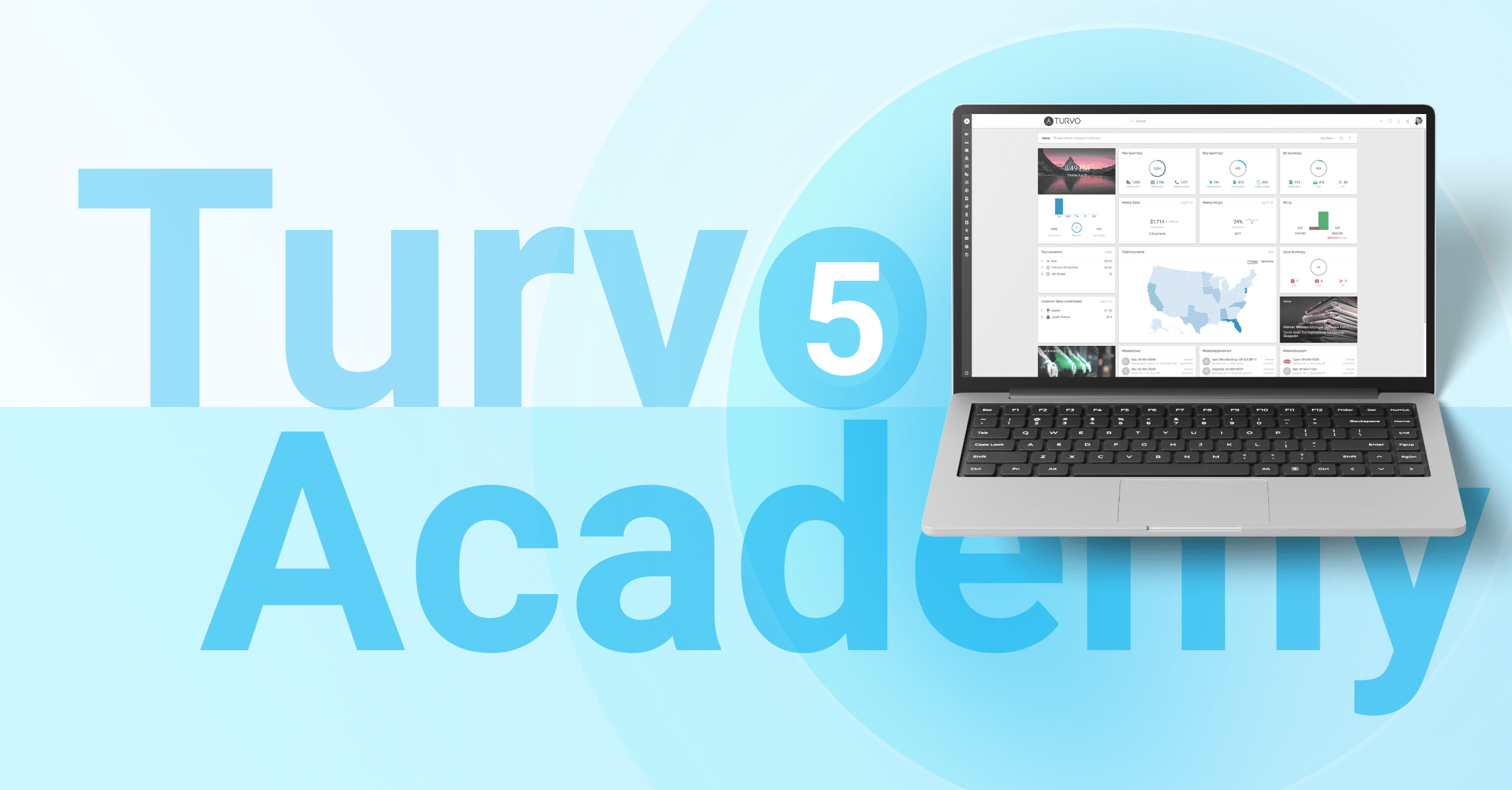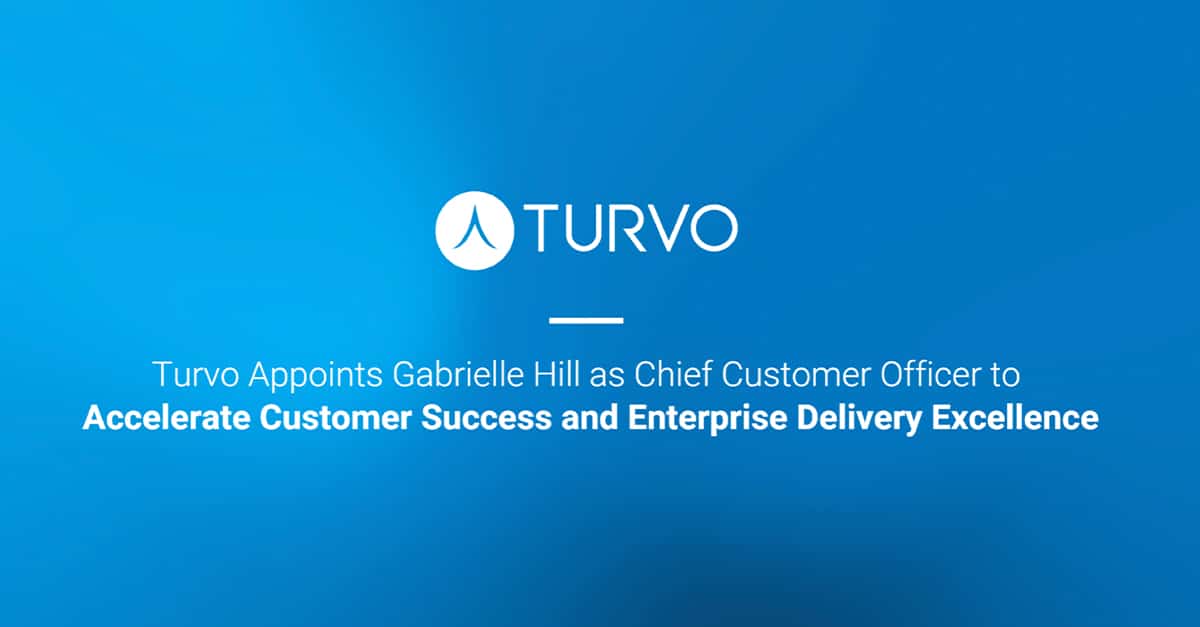Nick Reasoner, CEO of TransLoop, a digital freight brokerage, and Jeff Dangelo, Co-Founder of Turvo, a collaborative logistics technology platform, join “The Logistics of Logistics” podcast Host, Joe Lynch. Reasoner and Dangelo discuss with Lynch how launching a successful freight brokerage or 3PL in today’s modern logistics environment must include technology that empowers brokers to strategically and holistically solve customer’s problems while also providing a superior customer experience. The two entrepreneurs talk about how Turvo, a collaborative logistics technology platform, serves as the backbone of TransLoop’s operations.
The podcast starts with both freight brokerage and freight technology veterans sharing their shared backgrounds of getting their start at traditional mega brokers in Cincinnati. The experience gave them a first-hand look at the limitations and challenges of the operations of a traditional freight brokerage in addition to the limitations of the traditional, single-point solution technologies that are in use today.
Reasoner then shares how TransLoop launched its business with Turvo as its enterprise operating system to build strategic partnerships with customers, solve their problems, and put the attention on collaborative, long-term relationships. Let’s take a look at some of the episode’s themes and key takeaways.
The Challenges with TMS & the Value of Multi-Tenant SaaS for Collaboration
Lynch asked Dangelo, “Why did you start Turvo?” Dangelo talks about his time at a traditional mega-brokerage and notes that prior to launching Turvo, technology wasn’t focused on solving holistic supply chain problems, but instead, “The technology that we had was very siloed[.] [It] wasn’t built for the entire transportation network to work together. Even doing something as simple as creating continuous moves within our network was hard because of the unstructured data, the lack of data, and being able to put it together.”
Lynch continued to drill further down, asking, “You’re much more than that [TMS]. Tell me why Turvo is different.” To which Dangelo replied, “for us, we wanted to focus on what we call collaboration, which is the ability to bring in shared workflows between organizations. We’re actually solving the interaction between multiple companies working together on single shipments, or single orders, or inventory. That is what we do really, really well.”
Dangelo said there are two core ways that Turvo can aid transportation management participants to work with Turvo, which speaks to the flexibility of the collaborative logistics technology platform:
- Replace the TMS: this is where Turvo becomes the operations system and system of record, as it functions for TransLoop.
- Sitting on top of many systems of record: for really larger enterprise companies, like Turvo’s customer Ryder did with RyderShare, they build a platform with Turvo sitting on top of many systems of record, operating as an aggregation layer, allowing teams to digitize the way they work with shippers, carrier, and other organization that participate in those shipments.
The Challenges with the Analog, Manual Old School Freight Broker vs. the Digital Freight Broker
The lively conversation then moved onto the challenges of analog, non-integrated, manual old school freight brokers and the rise of the digital freight broker who employs collaborative logistics technology in their operations.
Reasoner and Dangelo discuss a normal day of a traditional freight broker, remarking on the challenges they face, which include:
- Using outdated legacy systems. Reasoner notes that “90% of every logistics company out there is operating on, inefficient tools that just create manual processes.”
- Buying point solutions and not being as thoughtful about technology’s role in operations. Most traditional freight brokerages have the experience of cobbling technology purchases over time as they need. TMS. Visibility. Document solution. Or other point-solutions. The traditional freight broker didn’t take a step back and think about “What is the customer’s experience? How can I solve their problems strategically and longterm?” noted Dangelo.
- Turnover and customer activity continuity due to non-integrated systems of record. Dangelo, in recalling his time at a mega-traditional freight broker makes the point that “one of the big problems that we face in my old world was the fact that we average less than 1% or 2% of our customers’ business. We weren’t adding value beyond that transaction where the customer wanted to use us more than spot business.” The more traditional freight brokerage has to keep hiring as they grow, “versus saying, “What do we solve for our customers? How do we do it differently? How do we have technology deeply rooted into their business, and actually add value?” This led to burnout on brokers and higher turnover instead of using technology to power operations, keep customer history, and hire the best talent that stays and keeps customers’ problems at the forefront.
- Building and maintaining your own technology: Dangelo speaks clearly to this growing challenge by traditional freight brokers and 3PLs, “We talk to so many 3PLs, and brokers, and shippers, and carriers. I think there is a perception that if you build it and you own the technology, it’s going to be the best technology, and we can control our own destiny.” However, he notes that those companies are only solving tactical problems instead of strategic ones such as “Where’s the truck?” And, “I can book this truck at a low market?” Instead, they need something more like Turvo, as Dangelo states, “companies that have Turvo have a much bigger leg up because they’re actually trying to solve more (strategic) problems than tactical ones.”
Bringing Systems and People Together to be a More Strategic Broker
As Dangelo and Reasoner spoke about the challenges of a traditional freight broker and how today’s modern freight broker utilizes collaborative logistics technology to solve customer problems and provide a better experience, Dangelo noted that Reasoner’s TransLoop, “has been more thoughtful in his approach to say, ‘I want to step back,’ and say, ‘What does the industry need?’ He talks about technology and asks bigger questions such as ‘How do I solve problems beyond the transportation and movement of the shipment?”
Dangelo believes “that’s where I think the industry’s going, and the companies that have the tech now to do that are the ones that are going to win in the future.”
Lynch turning to Reasoner double clicks into this new freight brokerage reality that Dangelo has painted in asking Reasoner, “when you started TransLoop, what were some of the things you wanted to do differently and better?” To which Reasoner explains, “We wanted to build something that was just such a different aspect from what the market was used to dealing with to create a more modern approach. What we do is, when we provide the platform we have that is powered by Turvo, we allow shippers to be a little more sticky on the day-to-day transaction. It allows them to want to work with us, more so. We’re not just working on spot freight all day, we’re looking for both contract and spot freight. I would say we just have a much more modern approach to what we’re really doing.”
In thinking about some of the challenges of traditional brokerages, Reasoner talks about some of the things he’s seen after starting TransLoop, in the way of new hires looking to work at TransLoop, “I’ve been talking to a lot of guys that are trying to come to TransLoop that have started brokerages and failed, essentially. I think a lot of these people are thinking that they can just get an Aljex, a McLeod, a DAT TMS of some sort and just pop open a brokerage. Yeah, shippers are in need of trucks right now, but what is another brokerage going to do for a shipper? There’s a reason that I think shippers have that negative connotation toward brokers, is because we’re just calling them constantly for business. TransLoop is offering them a systematic approach that can actually benefit them down the line. As we offer a lot of tools that eliminate the manual processes that they’re dealing with on a daily basis, I think the old-school model is … It works from a day-to-day action point from shippers just being able to transport goods. But I think a lot of shippers are realizing that that approach is expensive, and it’s costing them money, especially in today’s market.”
The Future Freight Broker Develops Deep Relationships with Customers, with Tech as the Driver, to Yield the Best Experience
The end of the podcast episode then focused on what is needed to launch a successful freight broker or 3PL in an age powered by technology, and what else, beyond technology, makes up the modern freight broker. Dangelo spoke about the business model as a critical consideration.
“One thing that we see is a lot of traditional brokers will build their business models and the way they charge around optimizing for that margin. I think in the future, brokers and 3PL are going to look very different. A 3PL that optimizes the interaction with the customer and the carrier to create different businesses or services that you monetize differently than just, ‘I’m moving a ship from point A to point B? Business model consideration is critical.”
Dangelo empowers that line of thinking by continuing with, “What problems will you solve for the customer? It should all start there. How do we bring the whole team from top down and solve your problems from a supply chain logistics perspective? How do we do it digitally with that business model, with the right people and the right support model? It starts with that vision, and it’s not duplicating the past.”
Reasoner joins in on making your freight brokerage a deeper part of the customer’s business to truly use technology to provide a better experience by talking about one of the first customers TransLoop acquired in their early days. “We went on site, and not only did we know what we were talking about with Turvo’s collaborative logistics technology, but I was showing dock workers how to track the trucks as they’re coming in to load. I was showing the board members, the CEO, and the COO how to track all their shipments in real-time. We were truly trying to find customers that would be sticky to us so we could handle all inbound and outbound shipments and not just their spot freight.”
In Summary: The Modern LSP is all about Customer Experience
The podcast was a lively conversation around what the modern freight broker of today looks like, and Dangelo summarized it best by saying “
“This idea of customer experience is not just about, how do we give them real-time visibility of where their stuff is? It’s also, how do they automate processes using technology? How do they give their customer’s customers the experience as well? The idea is not just, how do I solve my customer’s problems? It’s, how do I become the link or the chain that brings to life a problem-solving technology, and then the backbone of services to the ecosystem?”
Reasoner added one more thing before the end of the podcast that is critical in the freight broker industry by saying, “Being ethical is everything. That’s kind of the reason we started this, is why we wanted to build a more transparent, reliable, collaborative, ethical company. That’s everything for us. You don’t see drivers emailing or calling us for detention. There’s detention owed, detention is paid. We don’t really play the games of negotiating nonstop for detention layover. If the driver’s owed that, they’re paid that. Essentially we treat our carriers like our customers. Let’s be real. Every broker out there is saying that. I don’t think there’s a broker out there or a carrier out there that can’t agree that how we treat people shows a long way.”
And to close out the conversation, Dangelo and Reasoner both agreed that doing things right, holistically, and, the importance of growing smarter, not harder, is critical for the modern freight broker to win market share, protect profits, and keep customers happy. To get a demo of Turvo, the collaborative logistics technology, reach out today. To learn more about TransLoop, visit them on their website.

